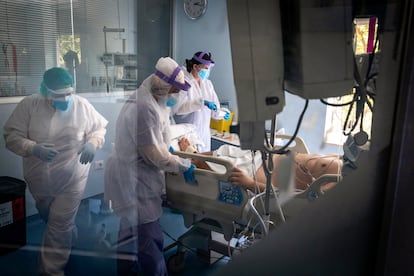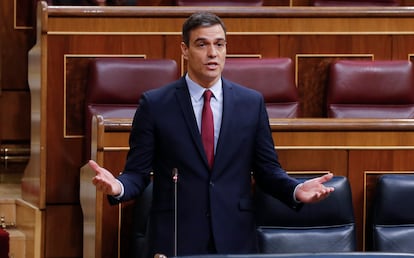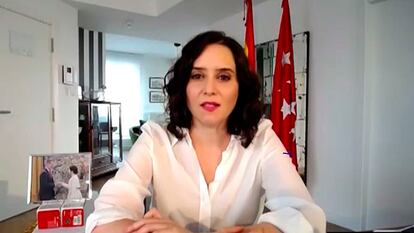Daily coronavirus-related deaths in Spain rise to 184, bringing total to more than 27,000
According to health officials, 10 of the country’s 17 regions reported fewer than 10 new cases of Covid-19 on Wednesday

The Spanish Health Ministry reported on Wednesday a slight rise in the number of daily coronavirus-related deaths, with 184 victims recorded in the past 24 hours, compared to 176 on Tuesday. The total number of victims in Spain now stands at 27,104.
According to the latest figures, there were 439 new coronavirus cases, as confirmed by PCR tests, bringing the grand total to 228,691. Today’s figure represents a 0.19% rise on the total. Since the beginning of the crisis, 140,832 patients have been discharged from hospital after recovering from the disease – 1,843 in the past 24 hours.
Speaking at the government’s daily press conference on Wednesday, Fernando Simón, the director of the Health Ministry’s Coordination Center for Health Alerts and Emergencies, said there was not much variation in the figures.
“The trend is very similar to the days before and we think that it will be maintained in the next few days,” he said.
According to the health official, 10 of Spain’s 17 regions had reported fewer than 10 new coronavirus infections. Simón also spoke about the use of face masks, which the government is considering making compulsory in all public spaces. “It is not easy to make the use of face masks obligatory for everyone, there are groups that cannot use them, or only for short periods,” he explained.
Spanish prime minister calls for unity
Spanish Prime Minister Pedro Sánchez called for political unity around the government’s coronavirus deescalation plan “to save lives and jobs” during a question and answer session in Congress on Wednesday.
“This Congress has a very important job, and I am asking you to stop the confrontation and pitch in,” said Sánchez, who heads a minority coalition government made up of his own Socialist Party (PSOE) and junior partner Unidas Podemos.

The prime minister added that the state of alarm, first introduced in mid-March and prolonged every two weeks, will need to be extended once again to keep the coronavirus outbreak under control. “We cannot relax measures if the virus continues to be among society. The state of alarm is a necessity,” he said.
But Pablo Casado, the leader of the conservative Popular Party (PP), insisted that his group would not support another extension. “We must relax the confinement measures according to at-risk groups, and replace once and for all the state of alarm,” said Casado. “You continue with your lies. We’ve had enough.”
Madrid premier under fire over luxury quarantine apartment
The premier of Madrid, Isabel Díaz Ayuso, has been questioned about the conditions of her residence in a luxury hotel. After testing positive for Covid-19 on March 16, the Popular Party (PP) politician went into self-isolation in an upscale hotel-apartment run by the Room Mate chain. Díaz Ayuso has since recovered from the illness, but is still living in the hotel.
The Madrid regional government has provided little information about the accommodation arrangements despite repeated questions from several media outlets, including EL PAÍS. In a press release on Tuesday, Room Mate maintained that Ayuso would personally cover the cost of the apartment “like any other guest, without any cost to the Madrid region.” The company said the price stipulated for the lodging was €80 a night, given that it was for a long-term stay.

But questions still remain. For instance, Díaz Ayuso explained in March that she had entered the luxury hotel on March 16, right after announcing that she had tested positive, in order to work more safely while in quarantine for 14 days. But the press release from Room Mate stated that the agreement was signed “before the state of alarm,” which was declared on March 14, or in other words, before the premier tested positive for Covid-19.
Questions have also been raised about a €565,000 public contract to the owner of Room Mate, Kike Sarasola. This agreement was to provide services for senior citizens at two hotels temporarily converted into residences. The contract was published on Madrid’s transparency website on Tuesday, but soon modified to replace Room Mate with the name of a different company, Coordinadora del Tercer Sector, and for a different amount, €240,443.57. Both the regional government and the hotel chain blamed the original information on “a mistake” and said there was never any contract between the two parties.
Opposition parties, however, have accused Díaz Ayuso of foul play. “The ethics code of top officials in the regional government, and of your own party, the PP, bans accepting gifts or benefits that could condition your actions as the head of the administration,” said Carmen Barahona, the secretary of the Madrid branch of the PSOE, on Tuesday.
The spokesperson for the Madrid branch of Unidas Podemos, Jacinto Morano, agreed that “public representatives cannot receive gifts of large amounts from the private sector, and even less so from a private-sector player that has been contracted [by the regional government].”
European Commission set to approve deescalation criteria
The European Commission is to approve on Wednesday a set of criteria to guide a three-stage deescalation of coronavirus confinement measures. The plan, which will cover the lifting of border controls, transportation, tourism and consumer protection, aims to ensure an orderly relaxation of the rules, and avoid the flurry of national measures that was seen at the beginning of the pandemic.
A draft of the document, to which EL PAÍS has had access, provides a roadmap on how to gradually ease from Phase 0, where there is widespread restriction on movement, to Phase 2, where border controls and restrictions are broadly lifted.
Under Phase 1, which most countries in Europe are approaching, Brussels would like restrictions to be eased to allow travel for professional reasons, and in cases where family members are located in different EU states.
Food lines in Madrid
More than 100,000 people in Madrid have been surviving on food donations from social services and neighborhood networks as a result of the coronavirus crisis. A viral video filmed on Saturday showed the extent of the problem, recording an endless line of people waiting to collect bags of food in the Madrid neighborhood of Aluche. “This is not Venezuela,” the narrator in the video says.
The neighborhood association in Aluche offers food to some 3,200 residents. It is one of dozens of social networks that has been handing out provisions to families hit by the coronavirus pandemic. Following the controversy caused by the video, it has been revealed that 101,942 people have been receiving food donations in the city of Madrid. In many of these cases, it is the first time they have had to ask for food, according to the Regional Federation of Madrid Neighborhood Associations (FRAVM).
“This is a totally new reality that has come with the crisis,” said Pepe Aniorte, who leads FRAVM’s family welfare department.
With reporting by Juan José Mateo, Luis de Vega and Bernardo De Miguel.
English version by Melissa Kitson.
Tu suscripción se está usando en otro dispositivo
¿Quieres añadir otro usuario a tu suscripción?
Si continúas leyendo en este dispositivo, no se podrá leer en el otro.
FlechaTu suscripción se está usando en otro dispositivo y solo puedes acceder a EL PAÍS desde un dispositivo a la vez.
Si quieres compartir tu cuenta, cambia tu suscripción a la modalidad Premium, así podrás añadir otro usuario. Cada uno accederá con su propia cuenta de email, lo que os permitirá personalizar vuestra experiencia en EL PAÍS.
¿Tienes una suscripción de empresa? Accede aquí para contratar más cuentas.
En el caso de no saber quién está usando tu cuenta, te recomendamos cambiar tu contraseña aquí.
Si decides continuar compartiendo tu cuenta, este mensaje se mostrará en tu dispositivo y en el de la otra persona que está usando tu cuenta de forma indefinida, afectando a tu experiencia de lectura. Puedes consultar aquí los términos y condiciones de la suscripción digital.









































